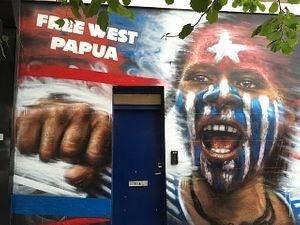In the middle of last month, in a surprising move by Indonesian authorities, high-profile West Papuan separatist leader Filep Karma was released after more than a decade behind bars.
Karma has been sentenced to 15 years in jail following a peaceful ceremony in West Papua’s provincial capital Jayapura, in which he raised the Morning Star flag, a symbol of the pro-independence movement. Human rights groups and representatives from the United Nations condemned his detention and designated Karma a prisoner of conscience.
The decision to release Karma four years early represents a substantive change in Jakarta’s political strategy towards the unsettled region.
Since West Papua’s transfer to Indonesia in 1969, West Papuans have been engaged in a long and bloody insurgency to establish an independent state. The Free Papua Movement grew rapidly in the late 1970sm with fighters joining its ranks in all major provinces of West Papua. Small-scale hit-and-run tactics against Indonesian patrols were favored by the movement’s leaders, together with targeted attacks on Indonesian and foreign mining companies. These attacks prompted a retaliation effort by Indonesian military forces, with official estimates putting the death toll among West Papuan separatists at more than 100,000 .
In an attempt to highlight the movement overseas, separatists soon adopted a more peaceful strategy of non-violence and a strong emphasis on diplomacy in lieu of an internal violent struggle. These changes had a major impact on support from human rights groups and foreign governments, and made it difficult for the Indonesian government to justify the use of force against peaceful protesters.
President Joko Widodo’s approach is starkly different from that of his predecessors. In his first move as president, Widodo lifted a 40-year ban on foreign journalists travelling to the region. He also appears to be taking a more conciliatory approach to the Free Papua Movement by seeking to regain their trust, addressing issues of inequality, underdevelopment, corruption and violence. The effort appears to be having an impact on international perceptions.
Widodo’s apparent emphasis on peacefully resolving the problem in West Papua places considerable pressure on West Papuan independence leaders, whose reliance on the violations of human rights has largely formed the basis of support for an independent state. A more conciliatory and approachable Jakarta is likely to be an effective handbrake on support for the independence campaign.
Respect for Indonesia’s sovereignty also comes amid strategic maneuvering within the South Pacific community, in which a number of Melanesian nations recently threw their support behind Indonesia’s sovereignty in West Papua at the 20th Melanesian Spearhead Group meeting in June 2015.
Widodo’s peaceful strategy towards West Papua therefore appears to be an extremely effective tool in destabilizing support for the Free Papua Movement, at least in terms of foreign government and civil society support. A strong and effective independence movement will likely have to change tack if it is to continue to raise awareness and support for the political campaign.
Ned Talbot is a postgraduate university student currently completing the Juris Doctor at the University of New South Wales. He recently completed an undergraduate honors thesis in 2014 on the independence movement in West Papua.

































